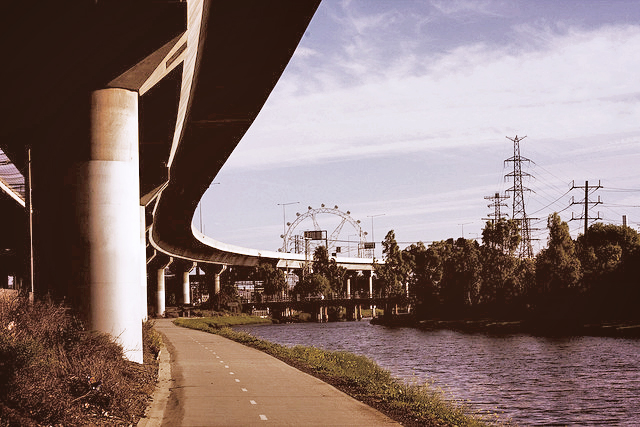Andrew F. Sullivan
The funds from the church were deposited in her name. The assets he couldn’t hide in Cayman banks or Swiss accounts were placed in safety deposit boxes which only she could open. The countless dollars invested by friends, family and parishioners—all of it floating in offshore bank accounts or squandered on those women out in Reno, the ones who will lick the salty tears off your face for five hundred dollars an hour. The endless shrimp he swallowed as his belly grew wider and wider, the gold watches he lost in cabs and limos with rented drivers and tinted windows. Albert Kale wants to apologize for all of this. He wants to make amends, but at the moment he is still struggling to breathe as water filters through the windows of his ’87 Camaro, a gift from his wife on their twentieth anniversary. It was his favourite car in their whole garage.
Albert Kale still believes drowning is less painful than hanging from his belt in a jail cell, swinging like some meaty pendulum. Albert Kale believes they would find him with his feet pointing north in the morning like a compass, a reminder of greater constants, of things beyond our brief reckoning here. He believes drowning will be less painful than a prolonged trial, than all those weeks on the stand, than facing the crowds that once came to worship in the house he built for the Lord. Albert Kale isn’t sure if he still believes in God. He knows death in this car in this river won’t happen in front of an audience. It won’t leave a bright red arc behind.
The water in this car is cold and it is up to Albert’s neck now. He keeps his seatbelt on because this is still supposed to be an accident. His heart pills, his liver pills, his pills for a back broken by one of his horses down in Louisville—they float around him in the car like spent confetti. Albert Kale knows he could have swallowed those pills in large handfuls. He has done it before in hotel rooms and on private ranches. Albert Kale is familiar with his pharmaceuticals, but he has no need for them now. He wants his system to be clean when they dredge this river outside his hometown, the river where all the kids used to swim and pitch bottles at passing boats until some girl on water skis took a Heineken in the eye and the cops started patrolling the shore.
Albert Kale remembers his friend Jonah telling him it didn’t hurt to drown. He told him it was like drifting off to sleep, like suffocating in a dream, like falling forever. Albert Kale believed Jonah because they were nine years old and Jonah was from Austin and his Mom never went to church. Albert Kale believed him because Jonah claimed he had once fallen off a fishing boat in the Gulf of Mexico, back when his Dad still lived with his Mom and they had two televisions in the house. As he drifted below the water, Jonah claimed, the fish followed him down from the surface. Their silvery shapes began to spell out his name as his chest filled with water. Jonah said it didn’t hurt, not until after. It was one of the Mexican labourers on the boat who pulled him out, who pushed the water out of his lungs and brought him back to life. Afterward, Jonah’s father told him all the splashing scared away anything worth catching.
Jonah called sometimes from halfway houses on the Louisiana coast. He called asking to speak to his old friend Albert Kale. He called because Albert’s ads were all over TV down there, pictures of his benevolent face radiating calm, collected understanding. Albert Kale understood. He understood why a man might hit his wife, why he might cheat on his taxes, steal from his neighbour, or even bury his own child in the backyard without a marker to signify the crime. Albert Kale understood the weak and weeping masses that poured into his holy church on the second and fourth Sundays after the welfare cheques came out. He understood them all.
The water begins to burble around Albert’s mouth and he considers undoing the seatbelt, but his hands are too cold. Jonah said they were still running the church’s ads alongside reports about Albert’s crimes, about the money that disappeared and all those people he promised salvation for a dollar ninety-five a day. Jonah called because all those sermons seemed to drip with the same words he told Albert—back when they were kids, back when Jonah couldn’t spell methamphetamine and didn’t like the taste of cold medicine. Albert hung up on him, but Jonah did not stop calling. He wanted Albert Kale to know about the two years in juvenile detention, about solitude and Ping-Pong and what it meant to be alone, surrounded by men with old teeth, new wounds and no fixed address.
Albert Kale wants to keep breathing, but the water continues to slip through the cracks of his Camaro. He wants to rethink his options, reapply whatever twisted logic forced him to plunge his vehicle into the water this cold November. He wants to emerge from this enlightened, but the pressure keeps the doors shut. The locks have shorted out and his arms are so tired. His wife will not forgive him for this. She will smile because that is what she does, but she won’t forgive him.
Albert Kale has no ID in his wallet. He can’t reach his back pocket to check, but he knows it isn’t there. It’s on a night stand somewhere with all his old receipts. Albert Kale wants someone to remember what his face looks like before it bloats beneath the water, before all the fluids in his body begin to turn to gas. His face won’t look like it does on the billboards scattered throughout the Midwest, the ones staggered up and down the back roads and the highways through dead and depleted towns. His face in these ads is clean shaven. His chins are tucked beneath a bright white collar. It’s his eyes though that cause motorists to pause, that cause men and women in motels without bibles to dial the 1-800 number. They imagine those eyes staring at them like a beacon as they clutch the phone against their neck and listen to Prince after the dial tone, waiting for Albert Kale’s voice to tell them about the fish spelling out his name beneath the water, the ones who told him it didn’t hurt to drown or die.
It was like falling through a dream, he would tell them. Like being lifted up again.
Albert Kale knows Jonah has called this number. Even as the water covers his eyes and small air pockets begin to escape from his nose, he can only think about Jonah calling that number to hear Albert Kale tell his story about the fish and the drowning sensation. Except in Albert’s version, it’s his father who saves him. There is no Mexican labourer—no one thought that would sit well with the listeners. Jonah would call and find Albert Kale there, telling his story in that calm and collected voice, the same one Albert used in interviews with journalists and state’s attorneys and the old lady from 20/20.
Jonah would call asking for Albert, asking if it really was his father. Jonah remembered Albert’s father as a hard man, a man who kicked them out of the attic, who stole cigarettes from his neighbours’ cars and once rabbit punched a teenager in line at the liquor store. The police said it cracked two vertebrae, but no one ever identified the attacker. Jonah wanted to know who this father was and why there was no Mexican labourer on that boat. Jonah called and called until he spoke to Albert Kale himself. Jonah said he wanted to talk. He wanted to know why.
It does not feel like a dream. Albert Kale’s arms and legs begin to spasm and shake in the water as his body fights for air, for a surface he can’t reach. The roof of the car will not budge against his balding head. It is not like drifting off to sleep. There is no one here to grab him. Albert Kale is collapsing from the inside out. Maybe a passing driver will spot his bright red car floating in the river. Maybe no one will notice the bits of Jonah’s shirt still clinging to the undercarriage. Albert Kale knows there will be no one there to judge him after this car finally sinks. Jonah asked him for credit, as if his story about those fish in the Gulf wasn’t a lie, some old concoction from a child’s mind. Jonah just wanted all the things Albert Kale had, all the things now slipping through his fingers, all those things trapped inside this car.
Albert just wants this to look like an accident. He wants to tell Jonah—what’s left of Jonah on the bloody floor of that parking garage—this was all an accident. Each cell in Albert’s body screams for air as his lungs swallow up the brackish water. There are no fish left in this river. They all died back when Albert’s father worked at the mill, back before all of this began to crumble, before Jonah said this was a peaceful way to die. He always was a liar.
Albert Kale knows you can’t fall forever. All things must come to rest.
Andrew F. Sullivan was born in Peterborough, Ontario. He has an MA in English in the Field of Creative Writing from the University of Toronto. Sullivan’s fiction has recently been published by Little Fiction, Joyland, The Cleveland Review and Riddle Fence. Sullivan no longer works in a warehouse. You can find him at: http://afsullivan.blogspot.com/.



